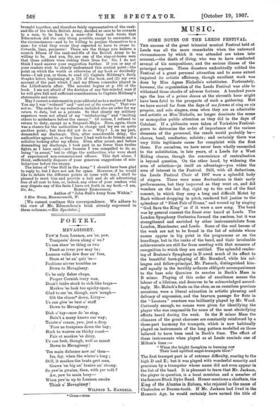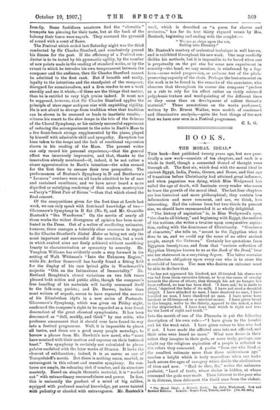MUSIC.
SOME NOTES ON THE LEEDS FESTIVAL. THE success of the great triennial musical Festival held at Leeds was all the more remarkable when the untoward circumstances by which it was attended are taken into account, —the death of Grieg, who was to have conducted several of his compositions, and the serious illness of the principal soprano. These disasters undoubtedly robbed the Festival of a great personal attraction and to some extent impaired its artistic efficiency, though excellent work was done by Miss Agnes Nicholls's substitutes. Fortunately, however, the organisation of the Leeds Festival was able to withstand these shocks of adverse fortune. A hundred years ago the loss of a prima donna at the eleventh hour might have been fatal to the prospects of such a gathering. But we have moved far from the days of ma femme et cing cu six poupies, and solo singers, even when they are as admirable and artistic as MiseNicholls, no longer dominate the scene or monopolise public attention as they did in the days of Catalani. If a plebiscite were taken of Yorkshire Festival- goers to determine the order of importance of the various elements of the personnel, the result would probably be— chorus, band, conductor, soloists ; and certainly there was very little legitimate cause for complaint with the first three. For ourselves, we have never been wholly reconciled to the substitution, in late years, of a Leeds for a West Riding chorus, though the convenience of centralisation is beyond question. On the other hand, by widening the area of selection—in itself an advantage—you widen the area of interest in the Festival. Still, with all deductions, the Leeds Festival Choir of 1907 were a splendid body of singers. There were some fluctuations in their early performances, but they improved as they went on, and did wonders on the last day, right up to the end of the final concert, in which they sang a long and difficult Motet by Bach without dropping in pitch, rendered full justice to the splendour of "Blest Pair of Sirens," and wound up by singing "God Save the King" as if it were a new song. The band was by general consent the finest ever heard at Leeds. The London Symphony Orchestra formed the nucleus, but it was strengthened and enriched by other instrumentalists from London, Manchester, and Leeds. Some of the real heroes of the week are not to be found in the list of soloists whose names appear in big print in the programme or on the hoardings, but in the ranks of the band, and their invaluable achievements are still far from meeting with that measure of recognition to which they are entitled. The splendid render- ing of Brahms's Symphony in D owed much of its effect to the beautiful horn-playing of Mr. Borsdorf, while his col- league and fellow-principal, Mr. Paersch, distinguished him- self equally in the terribly arduous obbligato accompaniment to the bass solo Quonians in sanctus in Bach's Mass in B minor. Playing of this order of excellence means the labour of a lifetime, and deserves to be acknowledged accord- ingly. Mr. Mantes feats on the oboe, as on countless previous occasions, were a liberal education in artistic phrasing and delicacy of expression, and the bravura passage for flute in the "Leonora" overture was brilliantly played by Mr. Wood. Curiously enough, no means were given for identifying the player who was responsible for some of the most electrifying effects heard during the week. In the B minor Mass the climaxes of the great choruses are constantly reinforced by a three-part harmony for trumpets, which is now habitually played on instruments of the long pattern modelled on those believed to have been used in Bach's time. The effect of these instruments when played as at Leeds reminds one of Milton's lines :— " When the bright Seraphim in burning row
Their loud uplifted angel-trumpets blow."
The first trumpet part is of extreme difficulty, soaring to the high D and E; but it was played with wonderful sonority and precision by a trumpeter whose name did not even appear In the list of the band. It is pleasant to learn that Mr. Jackson, the player in question, is a local musician and a member of the famous Black Dyke Band. Homer mentions a chieftain, the King of the Abantes in Euboea, who rejoiced in the name of Chalcodon or Brazen-tooth. If Mr. Jackson had lived in the Homeric Age, he would certainly have earned the title of
Iron-lip. Some fastidious amateurs find the " cherubic " trumpets too piercing for their taste, but at the back of the balcony their tones were superb. They crowned the pyramid of sound with a crest of flame.
The Festival which ended last. Saturday night was the third conducted by Sir Charles Stanford, and conclusively proved his fitness for the post. If the efficiency of a Festival con- ductor is to be tested by his gymnastic agility, by the number of new points made in the reading of standard works, or by the extent to which he intrudes his own temperament between the composer and the audience, then Sir Charles Stanford cannot be admitted to the first rank. But if breadth and sanity, loyalty to the intentions and the standpoint of the composer, disregard for sensationalism, and a firm resolve to see a work steadily and see it whole,—if these are the things that matter, then he is entitled to very high praise indeed. It must not be supposed, however, that Sir Charles Stanford applies the principle of stare super -antiquas vias with unyielding rigidity. He is not afraid to diverge from tradition when that tradition can be shown to be unsound or leads to inartistic results,— witness his resort to the slow tempo in the trio of the Scherzo of the Choral Symphony, or his entirely successful experiment of reducing the accompaniment to the solos in Bach's Mass to a few front-bench strings supplemented by the piano, played by himself with admirable skill and sympathy. Exception has been taken to the tempi and the lack of emotional expression shown in his reading of the Mass. The present writer can only record his personal experience,—that the general effect was immensely impressive, and that, thanks to the innovation already mentioned—if, indeed, it be not rather a closer approximation to Bach's intention—the solos seemed for the first time to assume their true perspective. The performances of Brahms's Symphony in D and Beethoven's "Leonora" overture were on all bands admitted to be of rare and sustained excellence, and we have never beard a more dignified or satisfying rendering of that modern masterpiece —Parry's "Bleat Pair of Sirens "—than that which closed the final concert.
Of the compositions given for the first time at Leeds last week, we can only speak with first-hand knowledge of two- Glazonnow's Symphony in E flat (No. 8), and Mr. Granville Bantock's "Sea Wanderers." On the merits of nearly all these works the widest divergence of opinion has been mani- fested in the Press. Out of a welter of conflicting estimates, however, there emerges a tolerably clear consensus in regard to Sir Charles Stanford's Stabat Mater as being not only the most important and successful of the novelties, but a work in which exalted aims are finely achieved without sacrificing beauty to characterisation or symmetry to sonority. Mr. Vaughan Williams has evidently made a step forward in his -setting of Walt Whitman's "Into the Unknown Region," while Dr. Arthur Somervell has hardly found a fitting field for the display of his rare lyrical gifts in Wordsworth'e majestic "Ode on the Intimations of Iinmortality." Mr. Rutland Boughton's choral variations on two folk tunes pleased both critics and public alike, though the composer's free handling Of his materials will hardly commend itself to the folk-song purists ; and Dr. Brewer, luckier than most writers of sequels, seems to have repeated the success of his Elizabethan idylls in a new series of Pastorals. Glazounow's Symphony, which was given on Friday night, confirmed the composer's right to be regarded as a true lineal descendant of the great classical symphonists. It has been denounced as "dull, muddy, and thick" by one critic, who professes amazement that it should ever have found its way into a festival programme. Well, it is impossible to please all tastes, and there are a good many people nowadays, to borrow a phrase from Mr. Hewlett's new novel, who "must have mustard with their mutton and cayenne on their buttered toast." The symphony is certainly not calculated to please palates surfeited with the later works of Strauss. It lacks the element of exhilaration ; indeed, it is as morne as one of Tourguenieff's novels. But there is nothing mean, morbid, or extravagant in this robust and massive symphony. Its con- tours are ample, its colouring rich if sombre, and its structure masterly. Based on simple thematic material, it is "worked out" with extraordinary resourcefulness and power. In flue, this is eminently the product of a mind of big calibre, equipped with profound musical knowledge, yet never tainted :with pedantry or clouded with extravagance. Mr. Bantock's
work, which is described as "a poem for chorus and orchestra," has for its text thirty rhymed verses by Mrs. Bantock, beginning and ending with the couplet :— "We are as ships upon the sea,
Sailing into Eternity."
Mr. Bantock's mastery of orchestral technique is well known, and is exhibited throughout his new work. One may cordially dislike his methods, but it is impossible to be bored when one is perpetually on the qui vine for some new experiment in sonority—the band, we may mention, is reinforced by a fog- horn—some weird progression, or arduous test of the pitch- preserving capacity of the choir. Perhaps the best comment on the work is to be found in the remarks of the annotator, who observes that throughout its course the composer "prefers as a rule to rely for his effect rather on richly coloured polyphonic texture and word-painting of the different lines as they come than on development of salient thematic material." These annotations on the works performed, written by Dr. Ernest Walker, were models of condensed and illuminative analysis,—quite the best things of the sort that we have ever seen in a Festival programme.
C. L. G.











































 Previous page
Previous page